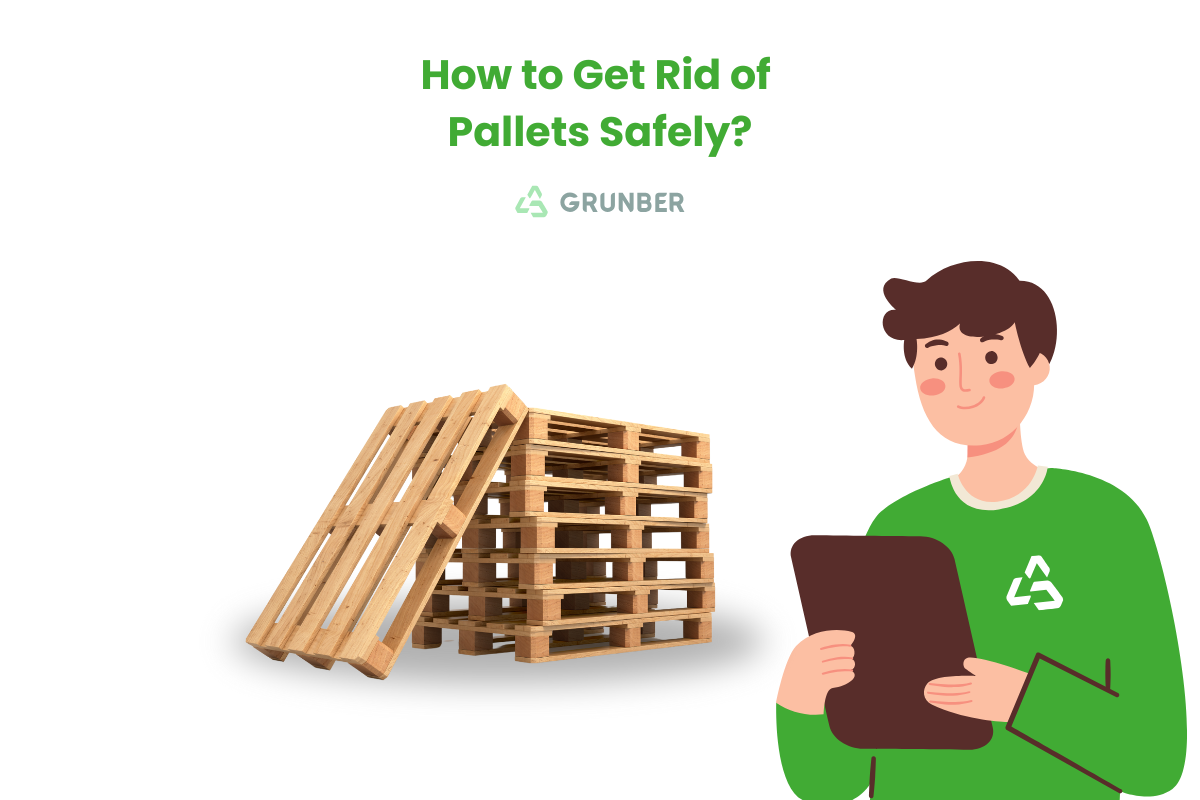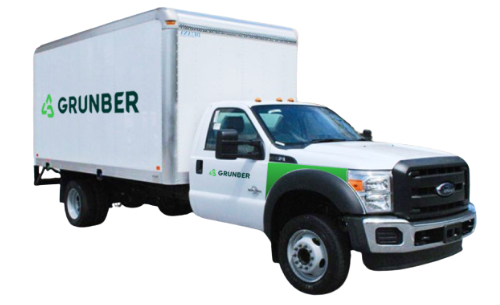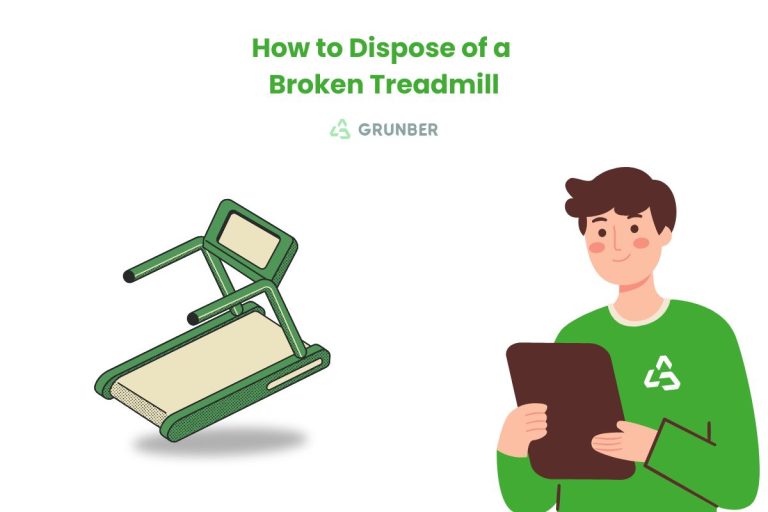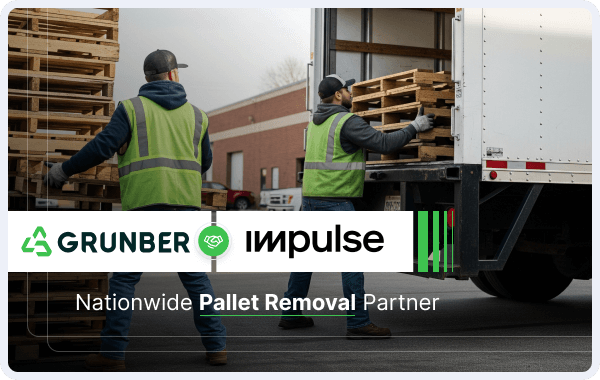Pallets are indispensable for shipping, storage, and moving inventory. Yet they can quickly accumulate in warehouses, backyards, and job sites if not handled properly. Whether you have wooden pallets, old pallets, or even plastic pallets, learning the best ways to dispose of them can help you reclaim valuable space, protect the environment, and follow local regulations.
In this comprehensive guide, we’ll cover multiple disposal methods—from repurposing to hiring professional removal services—so you can take the hassle out of pallet management.
5 Effective Ways to Get Rid of Pallets
Whether you have a few wooden pallets in your garage or a warehouse stacked high with unwanted plastic pallets, you don’t have to let them gather dust. Here are several proven strategies to manage and dispose of your pallets safely and responsibly:
Resell or Trade Your Pallets to Recoup Costs
If your pallets are still in good shape, selling them can help offset your storage or disposal expenses:
- Online Platforms: List pallets on marketplaces like Facebook, Craigslist, or specialized pallet buyback programs to find buyers who need them for shipping or projects.
- Bulk Buyers: Some companies specifically purchase large quantities of used pallets—even damaged ones—to repair and resell or grind into mulch.
- Local Businesses: Small retailers, garden centers, or farmers may be interested in gently used pallets to store products.
Pro Tip: The better the pallet condition, the higher the resale value. Consider bundling pallets by size and quality for a quicker sale.
Donate or Gift Pallets to Community Groups and DIYers
Don’t let usable pallets end up in a landfill if they can benefit others:
- Charities & Nonprofits: Some community organizations use pallets for donation drives, storage, or repurposing into shelters, planters, or furniture.
- DIY Enthusiasts: Hobbyists often seek free or low-cost pallets for woodworking projects like rustic tables and garden planters. Listing them as free on local platforms can help them find a new purpose.
- Schools or Art Centers: Educators might use pallets for student art projects, science demonstrations, or stage designs.
Pro Tip: Before donating, make sure pallets are clean, untreated, and structurally sound to avoid safety or pest issues.
Refurbish or Repurpose Pallets for Extended Use
For pallets that are only slightly worn or damaged, a little elbow grease can extend their usability:
- Repair & Reuse: Replace broken slats, remove protruding nails, and reinforce weak corners to give your pallets new life.
- Upcycle: Turn old pallets into furniture, compost bins, storage racks, or decorative wall art. It’s a creative way to keep pallets out of landfills while adding character to your space.
Pro Tip: Sand down rough edges and apply a protective sealant if using refurbished pallets for indoor projects.
Recycle via Certified Centers or Dedicated Pallet Programs
If your pallets are too damaged for reuse, recycling is the most eco-friendly disposal route:
- Wooden Pallets: Specialized facilities can break them down into wood chips for mulch or bedding, or repurpose usable lumber.
- Plastic Pallets: Many plastics recyclers accept pallets to melt down and form new plastic products, reducing plastic waste.
- Local Bulk Drop-Off: Some recycling centers host bulk drop-off days or have designated bins for wood and plastic pallets. Always confirm operating hours and guidelines before you go.
Pro Tip: Check your municipality’s website or resources like Earth911 to find recycling centers or pallet recyclers in your area.
Schedule a Professional Pallet Removal Service
If you have a large volume of pallets—or prefer a hands-off approach—hiring professionals can simplify the process:
- Junk Removal Services: Companies like Grunber handle the heavy lifting, ensure responsible disposal, and often partner with recyclers or donation sites.
- Waste Management Contracts: For ongoing pallet turnover, businesses can arrange regular pickups or work with a commercial dumpster provider to manage bulk disposal.
- Pallet Pooling Services: Some pooling providers rent and retrieve pallets as part of a closed-loop system, eliminating the need to store or discard them at all.
Pro Tip: Always verify a service’s eco-friendly policies and request an upfront quote to avoid hidden fees.
Grunber covers almost all US cities and states. If you are curious, here are some of our most searched cities:
How to Recycle a Pallet
Recycling a pallet involves more than simply dropping it off at a local center. Different materials, conditions, and regulations can impact how you approach the process. By learning how to assess and prepare your pallets, you’ll maximize their recyclability and minimize environmental impact.
Below is a complete guide to help you navigate every step, from identifying the type of pallet you have to finding the right recycler.
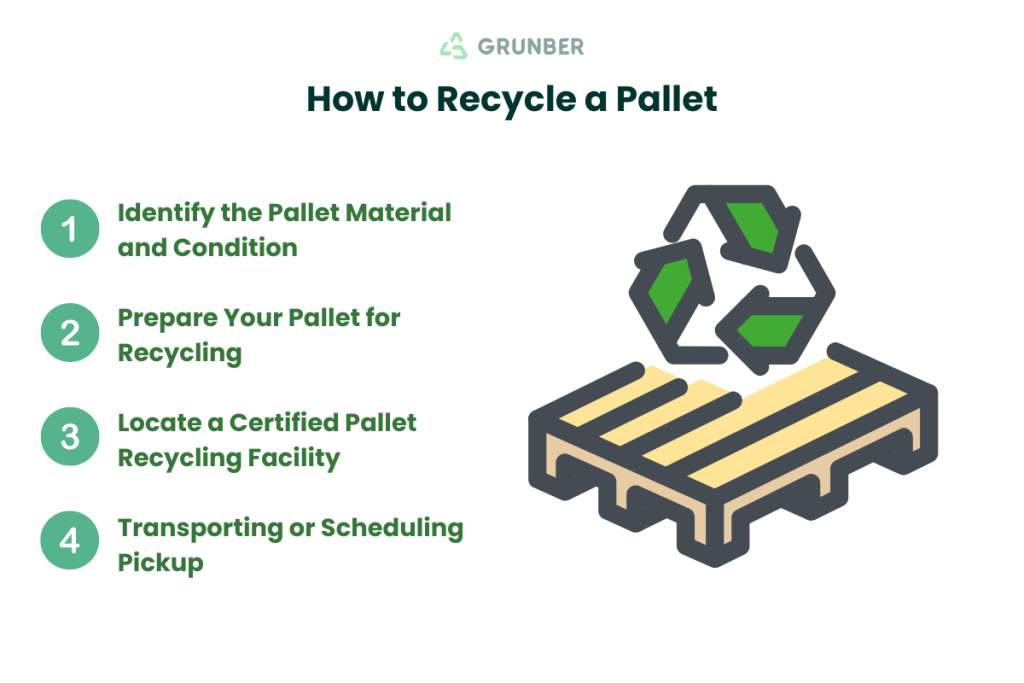
1. Identify the Pallet Material and Condition
The first step is to determine if you have a wooden or plastic pallet, as each requires a different recycling strategy:
- Wooden Pallets
- Types of Wood: Commonly made from pine, oak, or other hardwoods.
- Treatment Status: Check for stamps like “HT” (heat-treated) or “MB” (methyl bromide). Heat-treated pallets are safer to recycle; those treated with chemicals may be restricted by some recyclers.
- Condition: Inspect for broken boards, protruding nails, or heavy mold. Minor damage can often be repaired; significant rot or pest infestation might require special handling or disposal.
- Plastic Pallets
- Types of Plastic: High-density polyethylene (HDPE) and polypropylene (PP) are most common.
- Recyclability: Plastic pallets in good condition can be reused multiple times; broken pallets can sometimes be melted and reformed into new products.
- Identification Codes: Some plastic pallets feature resin identification codes to help recyclers determine proper processing methods.
Expert Tip: Take note of the weight, dimensions, and any visible markings (like chemical stamps or resin codes). This information is crucial when you contact recycling facilities.
2. Prepare Your Pallet for Recycling
Whether you have a wooden or plastic pallet, a few prep steps can make the recycling process smoother:
- Clean It Up: Remove loose debris, dirt, or spills. A quick rinse helps if the pallet is lightly soiled, but avoid adding moisture if the wood has signs of mold.
- Remove Fasteners: Pull out nails, screws, or staples if possible—especially if the pallet is heavily damaged or you’re dismantling it into raw materials. This step can also prevent machinery jams at the recycling facility.
- Separate Materials: If the pallet includes non-recyclable parts (e.g., attached foam or plastic wrap), trim or peel them off before drop-off.
Expert Tip: Wear work gloves, safety goggles, and closed-toe shoes to prevent injuries from splinters, nails, or sharp plastic edges.
3. Locate a Certified Pallet Recycling Facility
Finding a reputable recycler is crucial for ensuring your pallets are processed responsibly:
- Local Recycling Directories: Many municipal or county websites offer directories listing facilities that accept pallets. Some even have “Recycling Finder” tools to guide you.
- State or National Associations: Organizations like the National Wood Pallet & Container Association (NWPCA) or Earth911’s search tool can help you locate specialized pallet recyclers.
- Private Pallet Companies: Some businesses focus solely on refurbishing and recycling pallets, often providing pickup services if you have a large volume.
Expert Tip: Always call ahead to confirm operating hours, fees, or special requirements (such as removing nails or grouping pallets by type). This ensures a smoother drop-off experience.
4. Transporting or Scheduling Pickup
Next, decide how you’ll get your pallets to the recycler:
- Self-Drop Off: If you have a personal or company truck, ensure the load is secured with straps to prevent accidents or traffic violations.
- Professional Hauling Services: For large quantities or bulky loads, consider hiring a junk removal or hauling service like Grunber. They handle pickup, secure loading, and direct delivery to a certified recycler.
- Rental Bins or Roll-Off Dumpsters: In some cases, especially if you generate pallets on an ongoing basis, renting a dedicated bin for wood or plastic might be cost-effective.
Expert Tip: If you’re scheduling a pickup, keep all pallets in an easily accessible area—preferably stacked neatly on a flat surface—so the process is faster and safer for the pickup team.
You may also be interested in:
- See more how-to dispose guides.
Pallet Disposal FAQs
Is It Legal to Put a Pallet on the Curb?
In many places, putting pallets on the curb isn’t allowed unless it’s a scheduled bulk pickup or a designated collection day. Always check local ordinances or contact waste management to avoid fines.
Can I Recycle My Pallets for Free?
You might find free recycling options if a local facility accepts pallets at no charge, but many recycling centers charge a nominal fee. Community events or donation opportunities could also help you recycle without cost.
How Long Does It Take for a Wooden Pallet to Break Down in a Landfill?
Wood pallets can take years—even decades—to decompose in landfills, depending on humidity, temperature, and whether the wood was treated. Plastic pallets may last significantly longer, underscoring the importance of recycling or reusing them whenever possible.


